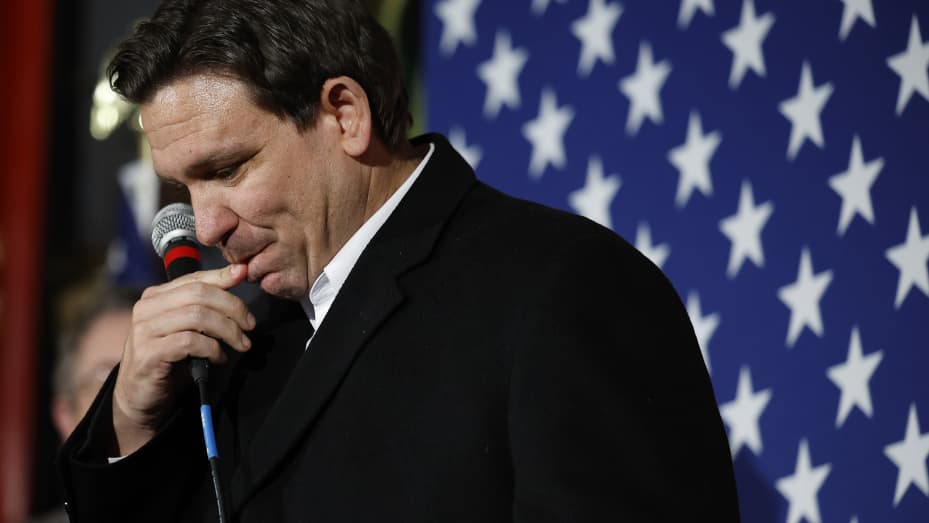In the Iowa caucuses, DeSantis faced significant challenges in establishing a personal connection with voters, resulting in a substantial loss.
Just ahead of the New Hampshire primary, Florida Governor Ron DeSantis has halted his Republican U.S. presidential campaign and thrown his support behind Donald Trump. This move marks the conclusion of a White House endeavor that fell short of the anticipated expectations for DeSantis to emerge as a formidable contender against the former president.
„In a video posted on X on Sunday, he expressed, ‘It’s evident to me that a majority of Republican primary voters are inclined to afford Donald Trump another opportunity.'“
New Hampshire’s primary, the inaugural in the United States, is set for Tuesday.
In a move to distinguish himself from former UN Ambassador Nikki Haley, who has been his primary rival for the second position in the race, DeSantis criticized her, asserting that the Republican party should not revert to the old guard of yesteryear represented by a rehashed form of corporatism embodied by Nikki Haley.
Despite entering the 2024 presidential race with substantial advantages and early polls indicating a strong position, DeSantis faced challenges. He and his supporters accumulated a substantial political war chest exceeding $100 million, and he could boast of a notable legislative track record on conservative issues such as abortion and the curriculum content related to race and gender in schools.
However, these advantages faltered in the reality of the 2024 presidential race. From a high-profile announcement marred by technical glitches to continuous disruptions in his staff and campaign strategy, DeSantis struggled to establish a firm footing in the primary. His defeat in the Iowa caucuses, a contest he had pledged to win, by a margin of 30 percentage points to Trump, underscored these challenges.
Now, with his suspension of the presidential bid after just one voting contest, DeSantis’s political future is uncertain. At 45 years old, he is term-limited as Florida’s governor.
DeSantis was widely anticipated to pose a substantial challenge to Trump in the presidential race.
Recognizing the perceived threat, Trump launched a vigorous attack on the Florida governor in the months leading up to DeSantis’s official announcement of his candidacy in May. This assault continued on the campaign trail, across social media, and through paid advertising in the subsequent months.
However, some of DeSantis’s challenges may have been self-inflicted. Despite a resounding re-election in Florida in 2022, he diverged from tradition by declaring his presidential bid on X during a conversation with CEO Elon Musk on a social media site. Technical issues plagued the announcement, making it difficult for the audience to hear his opening remarks.
In the ensuing weeks and months, DeSantis grappled with establishing a personal connection with voters. During his inaugural visit to New Hampshire, he upset local Republican officials by declining to take questions from voters, a customary practice in the state. Uncomfortable interactions with voters in other states were also captured on camera.
Financial troubles compounded over the summer. By the end of July, DeSantis had laid off nearly 40 employees, constituting about one-third of his campaign payroll. Public filings revealed that he was depleting his substantial campaign funds at an unsustainable rate.
Facing internal financial concerns, DeSantis leaned heavily on an allied super PAC for crucial campaign functions, despite legal restrictions against direct coordination between campaigns and super PACs. A complaint filed with the Federal Election Commission in December alleged that the coordination between DeSantis’s campaign and the Never Back Down super PAC exceeded legal limits. DeSantis dismissed the complaint as a „farce.“
The steady stream of negative developments eroded confidence among DeSantis’s donor network and potential supporters. As polling numbers stalled, he and his allies narrowed their focus to Iowa’s caucuses, abandoning the initially planned multistate strategy.
With his withdrawal from the 2024 presidential contest, DeSantis now redirects his attention to the remainder of his second and final term as Florida’s governor, set to conclude in January 2027.
